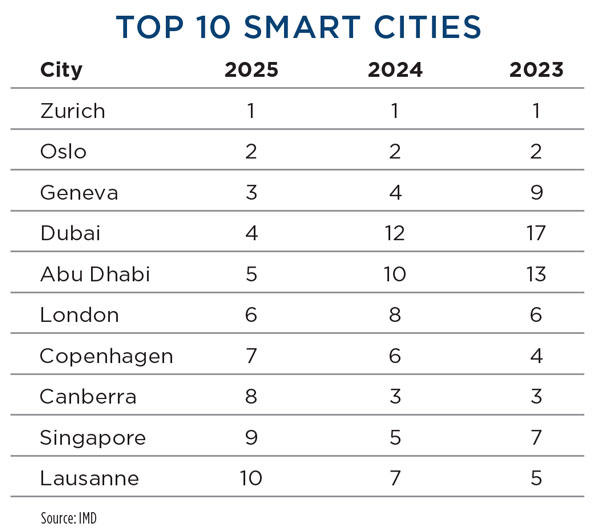Before the International Institute for Management Development (IMD) in June revealed that its home country of Switzerland, Singapore and Hong Kong topped its annual World Competitiveness rankings, the Lausanne-based institution’s World Competitiveness Center (WCC) in April unveiled the 2025 IMD Smart City Index, which found Zurich, Oslo and Geneva occupying the top three spots over 143 other cities. The report points out that the two Swiss cities in the top three, along with Oslo and No. 10 Lausanne (IMD’s home), “all lie outside the EU and yet are well integrated into it via trade and free movement agreements.”
Reached by email, WCC Chief Economist Christos Cabolis says the index “offers executives and decision-makers a unique lens into the urban experience as lived by residents. This is a critical and frequently overlooked dimension of location strategy. While traditional indicators focus on infrastructure or business costs, our index captures how well a city’s digital infrastructure, services and governance actually function in practice, as perceived by the people who live and work there.”
After viewing the rankings, Thibault Serlet, a partner at venture capital consortium Key State Capital, says, “Neutral countries such as Switzerland, Singapore, the UAE, Oman and Brazil are more likely to attract investors who are concerned about sanctions and counter-sanction. Whole war and chaos is generally bad for business. It is good for neutral and stable countries that manage to stay out of fights.” As for the cities within those countries, the right amenities count for something too. “Many investors expect high-tech facilities and laws that are available in their home countries,” Serlet says. “Smart cities step up to cater to this demand. For example, in the UAE the internet is heavily censored and VOIP (voice call software) is blocked. These restrictions are lifted in smart cities such as the Dubai Media City and Silicon Oasis.”

Abu Dhabi and Dubai made the top 10 for the first time, driven in part by high scores for medical services provision and green space. Others in the top 50 are on the rise as well:
Ljubljana, Slovenia ( up 16 to No. 16)
Warsaw, Poland (up 10 to No. 28)
Doha, Qatar ( up 15 to No. 33)
Vilnius, Lithuania (up 13 to No. 34)
Mecca, Saudi Arabia (up 13 to No. 39)
Riga, Latvia ( up 13 to No. 46)
Shenzhen, China ( up 10 to No. 50)
Cabolis says the index can be a leading indicator for talent attraction and retention; operational efficiency and service delivery; and long-term urban resilience. “Cities that strive to balance technology, inclusion and governance are often better positioned to respond to economic and environmental shocks,” he writes. “For executives planning location strategy, the above imply that smart, human-centric cities are not just places to operate. They may be strategic assets in competing for talent and long-term resilience.

